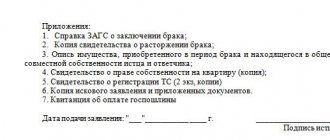Not all former spouses manage to peacefully agree on the division of property after a divorce, and then they have to go to court. Proceedings on such an issue can be seriously delayed and entail serious expenses. Often the only way to save time and money is through a settlement agreement.
Any legal proceedings on the division of property is a process that takes a lot of effort and time, and also requires specific knowledge. Therefore, in such a situation, it is worth contacting specialists in this field for advice.
What is a settlement agreement?
Part 2 of Article 38 of the Family Code of Russia states that spouses can come to an agreement on how and in what shares the division of property will be made. It is not specified at what stage of the divorce or proceedings the ex-husband and wife can come to an agreement, which means a settlement agreement can be reached at any time, even when one of the ex-spouses has already gone to court.
A settlement agreement is the expression of the will of both spouses, which is recorded by the court with the issuance of an appropriate resolution and the subsequent termination of proceedings in the case.
In such a situation, the ex-husband and wife resolve all issues regarding the division of property before the court makes a decision, write down all the main points of the agreement, certify it with signatures and submit this document to the court. The judge, having examined the document signed by the ex-spouses and making sure that the clauses written in it do not violate the laws and rights of third parties, satisfies the request of the parties. The decision to approve the voluntary division of property has the same legal force as any other court decision.
What issues are being resolved
The most common issue that is resolved in this document is the division of jointly acquired property. It practically occurs no matter how long the marriage has lasted. This type of property, for example, can even include gifts received for a wedding day. There may be different views on this, since they are given by relatives on each side, as well as by mutual friends and acquaintances.
If you have common minor children, a lot of issues may arise that it is advisable to resolve peacefully. It is necessary to decide which parent the children will live with in the future. Of course, in the vast majority of cases this will be the mother, however, it is possible that the father will take on this role, and this will be recognized as appropriate by both parents.
It is possible that if there are several children, there is a possibility of their separation - someone remains to live with their mother, and someone with their father. Such a decision may be made in connection with the availability of available housing or the greater emotional attachment of a particular child to his father or mother. This does not deprive you of the opportunity to see your children living separately and participate in their upbringing. This right is reserved for either parent.
The question of paying alimony inevitably arises. They can be paid either as a percentage of the income received or as a fixed sum of money. This may also be one of the points of the settlement agreement. If it is decided that alimony will be paid in a fixed amount, then its specific amount must be indicated in the agreement. An instruction should be made to increase it in connection with inflation and rising prices, which happens with enviable regularity. It may be stated that property given to the child can be counted as alimony.
A schedule of visits with children living separately may be established. It is drawn up taking into account various circumstances, and should not violate anyone’s interests. Spending time with children during vacations and holidays can be agreed upon.
If, during a divorce, a woman is on maternity leave or on leave to care for a child under three years of age, then the agreement may determine the issue of paying alimony not only to the child, but also to his mother. If alimony will be paid to several children, then the share of each of them is determined. The agreement may specify the end date of payments, for example, the full fulfillment of certain conditions, the child reaching adulthood or graduating from an educational institution.
Drawing up a thoughtful settlement agreement can prevent conflict situations from arising in the future. Its presence makes it possible to simplify the divorce procedure, since the main points will already be resolved.
Why shouldn't you rush to go to court?
First of all, because dividing property through the court is not a cheap pleasure. Key expense items are fees for lawyers and examinations. The cost of the latter can reach hundreds of thousands of rubles, while all expenses are paid by each of the parties to the litigation in equal shares, in proportion to the claims satisfied in favor of each of the spouses. Don’t forget how much time and nerves litigation can take. So if there is an opportunity to agree on everything without trial and enter into a settlement agreement, it is always worth taking advantage of it.
Important! Repeated appeal to the court on the issue of division of property after the conclusion of the agreement is impossible. However, if one of the parties evades fulfilling the conditions specified in the agreement, then the second spouse has the right through the court to force the first to fulfill all obligations.
Cancellation of the contract
Is it possible to cancel the settlement agreement? Cancellation of a signed document is provided for in accordance with the provisions of the agreement, or through the court (if the parties have not prescribed an algorithm for canceling the agreement in its text). At the will of the participants, the transaction is terminated if the procedure is specified in the text of the agreement.
Usually, transactions are canceled through the court if one of the participants does not fulfill previously assumed obligations. Unilateral refusal is not allowed, provided that the other party fulfills its obligations in good faith. In addition, the contract can be terminated if it is void at the time of conclusion, or if some of its provisions are subject to challenge.
What are the pros and cons of a settlement agreement?
A settlement agreement on the division of property will almost always be the best option for resolving a property dispute. The only negative aspect that can be noted is that upon reaching an agreement, one of the parties may receive a smaller share of the property than what it expected to win in court. However, do not forget that court decisions in such cases do not always meet the expectations of each party. Among the advantages, the following can be noted:
- Saving. As already mentioned, a settlement agreement will save money, time, and effort.
- Quick entry into force. A court decision often causes indignation by one of the parties, which is followed by appeals. Thus, the process of dividing property may drag on for several more months. The settlement agreement comes into force fifteen days after it is accepted by the court. And former spouses can even begin dividing property immediately after they have reached an agreement, without waiting for the end of the 15-day period. The exception is those cases when the right to some share of joint property needs to be registered with government agencies.
- Opportunity to achieve satisfactory conditions. When a court makes a decision, not always both parties to the proceedings are satisfied with its verdict. And a settlement agreement is always a compromise that obviously at least partially satisfies both parties.
Legal basis for dividing money
According to current legislation, the same principle applies to money and deposits as to other property: funds are divided equally. However, one cannot fail to take into account that money is a rather specific subject, and it is not always possible to complete the division in such a way that each party has no claims.
Unlike other property (for example, real estate or cars), it is difficult to determine exactly how much money to divide. Therefore, during a divorce, only those funds are divided, the receipt of which into the general family budget is documented.
As a rule, it is difficult to provide any documentary evidence in relation to cash, and therefore, fair division can most often only be counted on in relation to bank deposits.
How to draw up an agreement on the division of property?
In drawing up a settlement agreement, the assistance of a competent lawyer will be useful, and the text itself will depend on the circumstances of the particular case. But all agreements contain:
- the name of the participants in the trial and their data;
- a listing of the circumstances that prompted the initiation of the proceedings; information about who, when and with what demands went to court;
- an indication that both parties agree to a peaceful resolution of the dispute before the court makes a decision;
- an indication of the conditions on the basis of which the parties reached the agreement;
- request to the court to terminate the proceedings;
- signatures of the plaintiff and defendant, which confirm that both parties have read the document and agree to the conditions specified in it.
Also, any documents that are relevant to the case may be attached to the settlement agreement. These may be receipts, copies of title documents, copies of receipts for the transfer of funds, etc.
Sources:
RF IC Article 38. Division of common property of spouses
Mediation
It is difficult for former spouses who are unkindly disposed towards each other to come to a good result and adequately resolve all the issues left to them as an inheritance from their previous life together.
Federal Law No. 193 makes it possible to use the services of an official independent intermediary, called a mediator. His task is to actively participate in negotiations as a third party. This reduces the intensity of emotions and makes it possible to take advantage of the knowledge of the laws of the person for whom this is a profession.
The involvement of a mediator can be carried out on the initiative of one of the spouses, and with the consent of the second. Such an offer may be made orally or sent by mail. If the answer is persistent ignorance, then this will mean that the second spouse does not agree to such a solution to the issue, and no one has the right to force him to do so. Interestingly, the mediation procedure can be specified in advance in the marriage contract.
A mediator can be either an individual or a representative of a legal organization. In any case, having a legal education, knowledge of the laws in this area and the ability to correctly draw up such documents are welcome. The participation of several intermediaries at once is acceptable.
Before the negotiation process begins, it is necessary to sign a meditation agreement. It indicates the details of the participants in the negotiations, the subject of the dispute, and the validity period of the settlement agreement, which should not exceed six months. The participation of a mediator is not free of charge. Negotiators must pay all expenses equally.
Negotiations can continue as long as necessary to resolve all issues. They can be terminated early if the spouses sign a settlement agreement, or if they, without reaching a common agreement, leave their permission to the discretion of the court.
The deposit is open during marriage, but during separation
As a general rule, the funds will be divided equally. However, it is possible to avoid this, but only if the spouse who owns the account can prove that the money was deposited on it during the period of separation and belongs only to the owner of the deposit.
If the deposit is closed before the divorce
If the relationship worsens, the spouse who owns the account can close it and take away all the funds in it. These actions are against the law, but the process of proof can take a long time. Moreover, if it is possible to collect all the necessary evidence, the spouse who misappropriated the money will be obliged to pay half.
Let's summarize. The division of money and deposits can be done both pre-trial and in court (at the same time, according to current family law, cash and funds on deposits are divided equally). But, of course, regardless of the chosen option, the availability of professional legal support is a prerequisite for the funds to be divided in accordance with the principles of legality and fairness.
Sources:
Family Code of the Russian Federation dated December 29, 1995 No. 223-FZ
How does the division happen?
As in the case of other property, money and deposits can be divided during a divorce either on the basis of a settlement agreement or in court. The first option is considered the most preferable (especially when dividing money), since when going to court it is not always possible to provide evidence of how much funds are subject to division and whether they can really be classified as jointly acquired property.
Along with this, the legal proceedings themselves take time, so from any point of view, concluding a settlement agreement has its advantages.
Settlement agreement
So, a settlement agreement is a document that sets out the agreements of the spouses regarding the division of cash and bank deposits. A distinctive feature of such an agreement is that deposits and money are divided voluntarily, and the parties do not have any claims against each other.
There is no legally prescribed form of the document, but the text of the agreement must contain the following information:
- information about the parties;
- information about the conclusion and dissolution of marriage (if the marriage union has already been dissolved);
- the exact amount of funds (cash and deposits);
- a list of bank accounts in which savings are located;
- procedure for dividing deposits and cash;
- additional provisions;
- information about the place and date of signing;
- signatures of the parties.
Important! It is possible to draw up a settlement agreement both before, during and after a divorce. The parties can reach a peaceful agreement even during court proceedings (the main thing is to have time to conclude an agreement before a court decision is made).
The settlement agreement is subject to notarization. It should be taken into account that if one of the parties does not comply with the terms of the document, it is very difficult to achieve its enforcement. As a result, if events develop unfavorably, you will still have to go to court.
Judicial procedure for partition
Going to court in order to divide money and bank deposits may be necessary in a situation where the parties are unable to reach a common solution through negotiations. In general, the division of deposits and cash through the court is common. In order to divide the money, you will need:
- file a claim;
- collect evidence;
- competently present your position during court proceedings;
- obtain a court decision;
- ensure its implementation.
Important! When filing an application with the court, you must also submit a petition requesting information about deposits opened in the name of the spouse in banks. This will avoid a situation where a husband or wife can hide the presence of funds on deposits.
Specifics of dividing money in different situations
So, as a general rule, joint money is divided in equal shares, but in some cases the court may deviate from this rule. In addition, sometimes one spouse cannot claim funds at all. Let's look at the most common options that arise when a marriage is dissolved.
The deposit was opened during marriage, but the second spouse does not know about its existence
The opening of a deposit by one of the spouses during marriage (even if the husband or wife does not know about it) is not a reason for excluding these funds from the common property. As a result, if the existence of such an account becomes known during the divorce process, the money in it will be divided equally.
The deposit was opened during marriage, but personal funds are placed on it
As we noted above, as a general rule, contributions are divided in equal shares. However, deviations from this provision are possible if personal funds were placed on the account (a gift, funds from the sale of property purchased before marriage, etc.). The main difficulty lies in collecting evidence: the court excludes such contributions from the common property only if the relevant documents are provided.
The deposit is opened in the name of the child
Money that is in a child's account often becomes a subject of disagreement between ex-spouses. But the legislator has a clear opinion on this issue: deposits for minors are not subject to division.
The account was opened before marriage, but joint funds were deposited into it
In such a situation, the initial contribution is not subject to division, but those funds that were contributed after the marriage will be divided. In this case, the spouse who owns the account is required to pay compensation. If interest was accrued on the deposit, such income is also subject to division.








